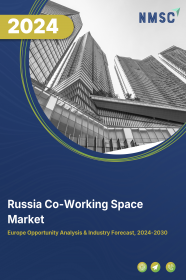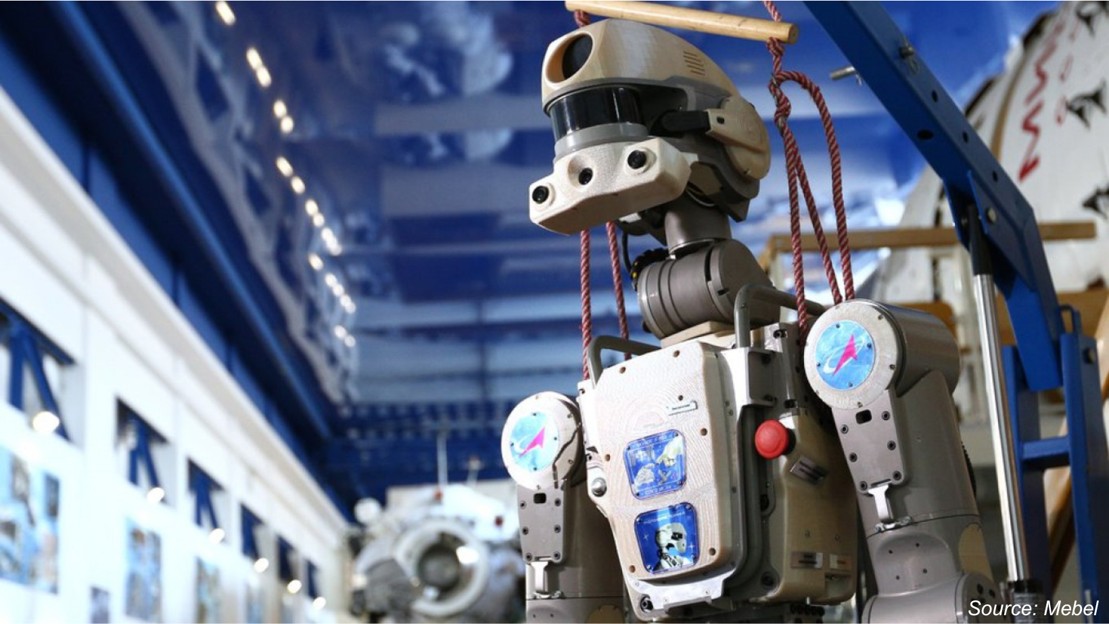
Russia Co-Working Space Market by Space Type (Shared Open Spaces, Enclosed Private Suites, Virtual Office Solutions, Event/Meeting Facilities), by Membership Type (Hot Desks, Dedicated Desks, and Others), by Business Type (Standard Coworking, and Others), by Business Model (Direct Ownership/Operation, and Others), by End User (Freelancers/Remote Workers, and Others), by Industry Vertical (Technology & IT Services, and Others) - Opportunity Analysis and Industry Forecast, 2024–2030
Industry: ICT & Media | Publish Date: 01-Nov-2025 | No of Pages: 203 | No. of Tables: 162 | No. of Figures: 79 | Format: PDF | Report Code : IC2031
Industry Overview
The Russia Co-Working Space Market size was valued at USD 160.6 million in 2023, and is predicted to reach USD 570.0 million by 2030, at a CAGR of 19.7% from 2024 to 2030. Co-working space represents a dynamic and adaptable solution to the evolving needs of businesses. These shared work environments offer flexibility in lease terms and space requirements, appealing particularly to startups and small enterprises seeking to avoid the upfront costs associated with traditional offices.
The communal atmosphere encourages networking and collaboration among professionals from diverse fields, fostering innovation and creativity. Equipped with modern amenities and strategically located, flexible workspaces provide cost-effective, scalable, and accessible alternatives for companies seeking a central presence without the constraints of long-term leases. The industry has experienced significant growth as businesses recognize the benefits of this model, embracing the collaborative opportunities and resource-sharing inherent in co-working spaces.
Rising Numbers of Freelancers and Small Businesses Fuel the Growth of the Market
The increasing number of freelancers, startups, and small businesses in Russia—driven by a growing entrepreneurial spirit and rapid digitalization—is a major driver of the co-working space market. These entities actively seek flexible, cost-effective workspace solutions, making co-working spaces an attractive option. Additionally, the global shift toward remote work and flexible work arrangements has further amplified this demand. As individuals and companies prioritize collaborative, network-oriented, and productive work environments, co-working spaces continue to gain momentum across the country.
Expanding Entrepreneurial Infrastructure and Strategic Investments Drive Market Expansion
Russia’s growing entrepreneurial ecosystem, supported by government initiatives and investments in technology hubs, incubators, and innovation centers, is creating favorable conditions for the expansion of co-working spaces. Strategic developments in the sector underscore its potential. For instance, the Tashir Group’s major investment in the Atmosphere co-working network exemplifies rising investor confidence. A notable example is the launch of a new co-working hub within Moscow’s iconic Izvestia building, covering 17,000 square meters over five floors. With an investment of 1.5 billion rubles, this project reflects strong belief in the viability of the co-working model and its ability to meet the evolving needs of Russia’s modern workforce. Such initiatives are key contributors to the sector's robust growth and long-term sustainability.
Rising Cybersecurity Challenges Hindering the Growth of the Market
Cybersecurity concerns pose a significant barrier to the widespread adoption of co-working spaces, particularly for businesses handling sensitive or confidential data. These shared work environments, which rely heavily on communal technology infrastructure, are inherently more vulnerable to security breaches, including unauthorized access and data leaks. This issue is especially pressing for organizations that must ensure the protection of client information, trade secrets, and proprietary data. The collaborative nature of co-working spaces increases risks related to network security, physical access control, and device exposure. As a result, many businesses remain cautious about fully embracing co-working models, potentially limiting market growth despite the sector’s overall expansion.
Integration of Augmented Reality (AR) and Virtual Reality (VR) Unlocks Future Growth Opportunities
The integration of Augmented Reality (AR) and Virtual Reality (VR) technologies is set to create significant new opportunities for the co-working space market. These immersive tools are transforming remote collaboration by enabling participants to engage in virtual meetings, collaborative projects, and training sessions with a heightened sense of presence and interactivity. By bridging geographical divides and enhancing the quality of remote interaction, AR and VR-equipped co-working spaces are expected to become highly attractive to tech-savvy freelancers, startups, and enterprises seeking innovative work environments.
A notable example is Sightful, a Tel Aviv-based company that launched Spacetop in May 2023—an AR laptop designed to blend digital content seamlessly with the physical world. Backed by USD 61 million in funding from prominent investors like Aleph and Corner Ventures, Spacetop offers an advanced computing experience that redefines traditional laptop capabilities. Such technological breakthroughs are poised to revolutionize remote work and co-working dynamics, drawing a broader user base eager for cutting-edge solutions.
As AR and VR adoption grows, co-working spaces that integrate these technologies will stand out as hubs of innovation, collaboration, and productivity, thereby driving market expansion and elevating the sector’s competitive edge.
Competitive Landscape
The Russia co-working space industry comprises various companies, including Regus Group Companies, Praktik, HQ, RED Factory, Crown Workspace, SOK, KALIBR, The Coworking Spaces, Office Hub, Key Co Working, Rubin, , Rabochaya Stantsiya, Easy Offices, Aticco,, LiquidS, Space 1, Cabinet Lounge, DI Telegraph, Coworking Office 24/7, All Partners Coworking, Creative Cluster S52, Ziferblat and others.
The Russia Co-Working Space Market Key Segments
By Space Type
-
Shared Open Spaces
-
Enclosed Private Suites
-
Virtual Office Solutions
-
Event/Meeting Facilities
By Membership Type
-
Hot Desks
-
Dedicated Desks
-
Private Office Leases
-
Hybrid Flex Passes
By Business Type
-
Standard Coworking
-
Premium Managed Offices
-
Niche/Specialized Spaces
By Business Model
-
Direct Ownership/Operation
-
Franchise/Partnership
-
Real Estate Collabs
By End User
-
Freelancers/Remote Workers
-
Startups (<10 Employees)
-
SMEs (10–250 Employees)
-
Large Enterprises (>250)
By Industry Vertical
-
Technology & IT Services
-
Financial & Professional
-
Healthcare & Life Sciences
-
Manufacturing & Logistics
-
Public Sector & Education
-
Others
Key Players
-
Regus Group Companies
-
Praktik
-
HQ
-
RED Factory
-
Crown Workspace
-
SOK
-
KALIBR
-
The Coworking Spaces
-
Office Hub
-
Key Co Working
-
Rubin
-
Rabochaya Stantsiya
-
Easy Offices
-
Aticco
-
LiquidS
-
Space 1
-
Cabinet Lounge
-
DI Telegraph
-
Coworking Office 24/7
-
All Partners Coworking
-
Creative Cluster S52
-
Ziferblat
Report Scope And Segmentation
|
Parameters |
Details |
|
Market Size in 2023 |
USD 160.6 Million |
|
Revenue Forecast in 2030 |
USD 570.0 Million |
|
Growth Rate |
CAGR of 19.7% from 2024 to 2030 |
|
Analysis Period |
2023–2030 |
|
Base Year Considered |
2023 |
|
Forecast Period |
2024–2030 |
|
Market Size Estimation |
Million (USD) |
|
Growth Factors |
|
|
Companies Profiled |
22 |
|
Market Share |
Available for 10 companies |
|
Customization Scope |
Free customization (equivalent up to 80 working hours of analysts) after purchase. Addition or alteration to country, regional, and segment scope. |
|
Pricing and Purchase Options |
Avail customized purchase options to meet your exact research needs. |

















 Speak to Our Analyst
Speak to Our Analyst

























